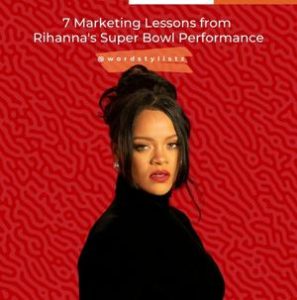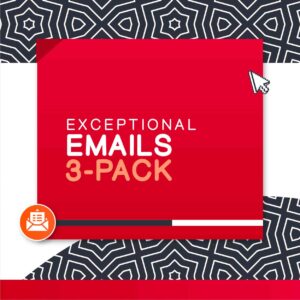
What Is Copywriting? Your Ultimate Guide for Long-term Success
What is copywriting? While the definition may vary slightly depending on who you ask, our straightforward definition is this: Copywriting is the art of having
The Product Lounge is now closed. All final orders will be delivered within 10 business days. Please see Terms and Conditions for more details.

Copyright vs. copywriting is a word battle that has left entrepreneurs scratching their heads in confusion for decades. These two words are homophones (words that sound the same but are spelled differently and have different meanings) that have been transposed and used incorrectly for far too long.
It’s time to spell out the difference (no pun intended) between copyright vs. copywriting once and for all. From this point forward, this article will be your guiding source on what copywriting is and the difference between copyright vs. copywriting. And because effective communication is our superpower, we’ll make the explanation easy to understand and digest.
In this post, we’ll explore the differences between copyright vs. copywriting, trademark vs. copyright, copyright vs. patent and SEO vs. copywriting. But first, here’s an essential hint on deciphering between copyright vs. copywriting:
There’s some writing involved if “write” is a part of the word.
And without further ado, let’s end the confusion once and for all between copyright vs. copywriting.
Before we dig too deep into the discussion on copyright vs. copywriting, let’s first clear up some definitions. A copyright is a person’s ownership of a creative work they have produced. With a copyright in place, the owner has the legal and exclusive right to sell, publish, reproduce, or distribute the intellectual property associated with the protected creative work. This work could be literary work, a song, movie, or other artistic work. Copyrights are registered with and monitored by the U.S. Library of Congress.
Copyrights protect individuals and organizations from plagiarism, ensure the general public knows they own the work and allow them to maintain legal ownership of what they created.
According to the U.S. Copyright Office, copyrights apply to original works of creative expression that are captured in a tangible form. Once the original creator of the work receives a copyright, they can choose to sell their rights to other parties.
However, under section 107 of the Copyright Act, copyrighted works can be used or borrowed without the creator’s permission for “fair use” purposes, such as education or commentary.
Examples of works that can be copyrighted include:
Copywrite is a rarely used derivative of copywriting. While this term is not technically incorrect, nothing says inexperienced, like using the word “copywrite” to reference what copywriters do. For those who sling sales sentences for a living, we don’t “copywrite.” We “write copy.”
Copywriting is the process of writing persuasive content for the purpose of marketing and promoting a product or service. This includes written content that appears on websites and billboards, and in ads, emails, newsletters, press releases, blogs, social media posts, and more.
A copywriter is a professional writer responsible for crafting the written content brands use for their marketing, sales and promotional materials. A copywriter’s goal is to get people to purchase your product, and their superpower lies in their ability to take potential buyers on a journey from skeptical to smacking the buy button®.
You see copy every day – in television commercials, on billboards on your way to work, in the countless emails flooding your inbox, and on social media – almost everywhere.
Great copy taps into buyer emotions and persuades targeted audiences to take a specific action – download, buy, read or shop. Whether they’re crafting a 3-word tagline, a 250-word email or a 30-page sales page, copywriters understand how to add just enough meaningful words to sales, marketing and promotional materials to capture attention and influence action.
Check out a few copywriting samples from top brands in our small business copywriting post.
Now, copyright should not be confused with its cousin trademark – they are not the same. And that’s because while copyrights protect original works of authorship, trademarks protect symbols, designs, words or phrases used to identify a person’s or company’s goods or services.
For example, we have registered trademarks with the U.S. Patents and Trademarks Office (USPTO) for Word Stylistz®️, the name of our done-for-you copywriting services and smack the buy button®️, a signature phrase we use to market, promote and sell our products and services. Because we have these phrases trademarked, other brands cannot use them without express permission.
To recap the difference between copyright vs. copywriting, copywriting is the act of writing persuasive copy for marketing, sales and promotional purposes. A copyright protects original work, such as art and literature. And let’s throw in copyright vs. patent to be on the safe side: A patent, unlike a copyright, safeguards new inventions, processes and scientific creations.
Patents, copyrights and trademarks are different types of intellectual property (IP). IP is a set of intangible assets of the human intellect.
To end our discussion on copyright vs. copywriting, we’ll clarify the difference between search engine optimization (SEO) writing and copywriting. SEO writing leverages keyword research, SEO strategy and foundational copywriting methods to craft social media content, website copy, digital product descriptions and other web content.
While SEO writing has some copywriting characteristics, the key difference is the overall objective. SEO writers focus on educating readers and increasing search engine rankings, whereas copywriters focus on using persuasive content that attracts leads and turns leads into buyers.
Now that you’re super clear on the differences between copyright vs. copywriting, let’s talk about done-for-you copywriting services. Whether you need some copy written or you’re interested in learning more about how to join our team of top-rated copywriters, hit us up. If you’re ramping up your next marketing campaign or product launch, check out our Product Lounge of quality copywriting services to ensure you have the cash-generating words you need to surpass your sales goals!
Check out our Careers page if you think you have what it takes to be our newest sentence slinger. If you loved this blog post on copyright vs. copywriting, share it on your social media. Much love + gratitude for taking the time to learn about copywriting.

What is copywriting? While the definition may vary slightly depending on who you ask, our straightforward definition is this: Copywriting is the art of having

Finding and hiring the right copywriter for your brand is an important decision that can have a significant impact on the success of your online

The Rihanna marketing strategy and her overall Savage-Fenty campaign are two prime examples of how to create an attention-grabbing content and stamp your brand in

What’s the difference between a sales page vs. landing page? In short, landing pages are used to gather contact information, while sales pages are used



